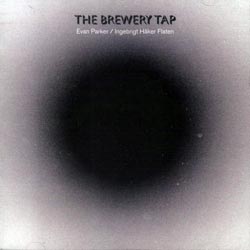
With a discography and list of collaborators two yards long, you have to invent a word that combines "prolific", "infinity" and "plus one" to properly measure Evan Parker's output. Listening to examples of his evolution over 40 years, the obvious reason for his unceasing work ethic is simple: he's still trying to find his voice in a seemingly unreachable space "where sound and noise turns into music...where music turns into sound and noise" (The Wire 279). Parker's latest partnership with 37-year old Norwegian bass great Ingebrigt Håker Flaten (whose résumé includes tours and recordings with everyone from Otomo Yoshihide to Joshua Redman to Yusef Lateef) is a marvelous illustration of this soul searching mission.
Recorded live at 2007 Oslo Jazz Festival, The Brewery Tap is a mix of equal parts pantonality and aleatoric freak-outs with cohesive form-based composition and "traditional" bebop swing. The duo eases into the 24-minute "Eroica", an otherwise jazz standard, though one read from a messy chart with "go as far away as you can" scrawled just before al coda. Flaten begins with tip-toed, spacious pizzicato phrasing along-side Parker's meandering sultry dips and throaty licks, gradually nudging the tempo and texture from serene to just-before-frantic; as the mood teeters towards explosive, the bassist audibly voices his excitement by humming, yelping and quasi-scatting in tandem with his performance before sedating into a blend of idiomatic, hard bop "walking" arpeggiations. Unable to keep their composure for long, they release an uproarious frenzy, and Parker launches into a trademark flight of circular breathed virtuosity, honking and racing through a spectrum of harmonics and multiphonics. Flaten gathers his thoughts for a few minutes and returns with an equally fantastic solo, initially emulating Parker's tones with a bowed, high register fury then placing his own stamp (a marginally similar variation of melodies from Beethoven's opus of the same name) to signal a scene change. Flaten and Parker continue the same crosscut methods for the next nine minutes, delicately weaving out of each other's way then deliberately — and playfully — butting heads via juggled rhythms, wandering counterpoint, noise bursts and sudden, scrapped ideas that eventually make sense in this patchwork macrocosm.
With an endless bag of tricks, Parker and Flaten explore each other's dialect and the depth of their instruments (sans electronics and studio manipulation) to create a unique sonic architecture on each of these three pieces. The duo's work is a power surge in the resurrection of the comatose language of jazz — a reanimated corpse capable of extraordinary, surprising yet still listenable heights when given a suitable coaching.
Comments and Feedback:
|



